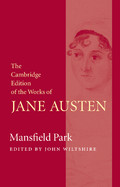Book contents
- Frontmatter
- Contents
- General Editor’s preface
- Acknowledgements
- Chronology
- Introduction
- Note on the text
- Volume I Mansfield Park
- Volume II Mansfield Park
- Volume III Mansfield Park
- Introductory note on Lovers’ Vows
- Lovers’ Vows
- Corrections and emendations to 1816 text
- Appendix: Commentary on the text
- Abbreviations
- Explanatory notes
Introduction
Published online by Cambridge University Press: 18 December 2020
- Frontmatter
- Contents
- General Editor’s preface
- Acknowledgements
- Chronology
- Introduction
- Note on the text
- Volume I Mansfield Park
- Volume II Mansfield Park
- Volume III Mansfield Park
- Introductory note on Lovers’ Vows
- Lovers’ Vows
- Corrections and emendations to 1816 text
- Appendix: Commentary on the text
- Abbreviations
- Explanatory notes
Summary
COMPOSITION AND PUBLICATION
Mansfield Park, the third of Jane Austen's novels to be published, appeared in three volumes in May 1814. It was the first to be written, and probably to be conceived, after Austen settled down to write at Chawton in 1809. Her first book, Sense and Sensibility, was accepted by the publisher, Thomas Egerton, by February 1811, and according to her note, Mansfield Park was ‘begun somewhere about Feby 1811 – Finished soon after June 1813’. Yet the approximation of these dates contrasts with the precise ones her sister Cassandra gives for the composition of Emma and Persuasion, Emma taking fourteen months from 21 January 1814 to 29 March 1815, and Persuasion the year from 8 August 1815 to 6 August 1816. On this dating, Mansfield Park took about twenty-eight months to write, compared to the slightly longer Emma, which took half that time. And though the earlier novel, according to the memorandum, was more or less ‘finished’ in June, it was eight or nine months more before the manuscript was taken to London to be published.Why, on this evidence, Mansfield Park took so long to write, and why it was then held back from publication – if this indeed was the case – are significant questions. It is clear, though, that for Jane Austen this novel's publication was very important. Explicitly set in the contemporary world, and with several references to current events and controversies, Mansfield Park marked the beginning of a new phase of her writing.
These memoranda may conceivably suggest that Austen was merely planning the novel in early 1811. DeirdreLe Faye comments that ‘it seems unlikely that the actualwriting of this work could have started at so early a date’ as February 1811, since Austen was then busy with both Sense and Sensibility (correcting proofs) and revising Pride and Prejudice. She conjectures that Mansfield Park was begun after Pride and Prejudice had been finished, ‘probably in the spring of 1812’, thus reducing the time taken in actual writing to just about the same as Emma. References in Austen's surviving letters during 1813 have usually been assumed to indicate the progress of the novel's composition, and might support Le Faye's suggestion, if we assume that Jane Austen's requests for information refer to a project that is at that moment on hand.
- Type
- Chapter
- Information
- Mansfield Park , pp. xxv - lxxxivPublisher: Cambridge University PressPrint publication year: 2005

